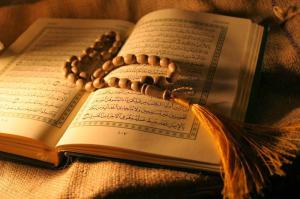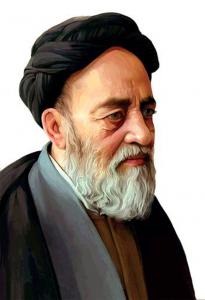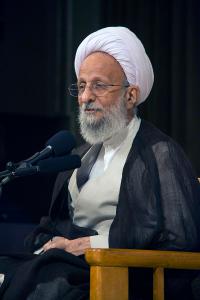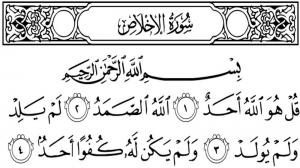Quranic Sciences
The Marriage of Fatima al-Zahra (S.A) with Imam Ali (A.S)
- Published at
-
- Source:
- www.maaref-foundation.com

The Marriage of Fatima al-Zahra (S.A) with Imam Ali (A.S)
Quran strategy on its Own Preservation Part 1
- Published at
-
- Author:
- Fatemah Meghji
- Source:
- Ahlul Bayt World Assembly, Journal: Vol. 16, no 4, Winter 2016
 For Muslims, the Qur’an is the unchallengeable word of God. Its inimitability, eloquence, outstanding use of the Arabic language, and scientific accuracies has been the subject of many discussions among Muslims and non-Muslim scholars alike. And given the issue of alteration in other divine scriptures, the discussion of tahrif (alteration) has also been examined. Has the Qur’an been changed like other divine books? Moreover, how is God a preserver over the Qur’an?
For Muslims, the Qur’an is the unchallengeable word of God. Its inimitability, eloquence, outstanding use of the Arabic language, and scientific accuracies has been the subject of many discussions among Muslims and non-Muslim scholars alike. And given the issue of alteration in other divine scriptures, the discussion of tahrif (alteration) has also been examined. Has the Qur’an been changed like other divine books? Moreover, how is God a preserver over the Qur’an?
A Glance at the Qur’anic Term Milla and the Concept of an Islamic Ummah
- Published at
-
- Author:
- Sayyid Ahmad Rahnamaei
 There are two Qur’anic terms that imply more or less the notion of a nation. One of these is milla, which is mentioned seventeen times in fifteen verses. In defining the concept of milla, Raghib Isfahani, in his dictionary of Qur’anic words and expressions, states that milla, imlal and imla’ are all of the same root.
There are two Qur’anic terms that imply more or less the notion of a nation. One of these is milla, which is mentioned seventeen times in fifteen verses. In defining the concept of milla, Raghib Isfahani, in his dictionary of Qur’anic words and expressions, states that milla, imlal and imla’ are all of the same root.
The Holy Qur'an's Teachings about the Creator of the World
- Published at
-
- Author:
- Allamah Syed Muhammad Husain Tabataba'i
 Explanation: In daylight, everything is visible. We can see ourselves, others, houses, city, desert, mountains, jungle, and sea. But when the darkness of night prevails, all these bright and evident things lose their brightness. Then we realize that this brightness did not belong to them, rather it was due to the sun which illuminated them by a kind of contact. The sun is bright and, with its reflection, makes the earth and all that is on it bright and visible. If these objects had a brightness of their own, they would never lose it.
Explanation: In daylight, everything is visible. We can see ourselves, others, houses, city, desert, mountains, jungle, and sea. But when the darkness of night prevails, all these bright and evident things lose their brightness. Then we realize that this brightness did not belong to them, rather it was due to the sun which illuminated them by a kind of contact. The sun is bright and, with its reflection, makes the earth and all that is on it bright and visible. If these objects had a brightness of their own, they would never lose it.
The Extremists and Misinterpretation of the Holy Qur’an
- Published at
-
- Author:
- Ahmad Namaee
- Source:
- Book "Caliphate and Imamate "
 “A group of the extremists (ghulat) believe that the Holy Qur'an is misrepresented. Some chapters and verses on 'Ali's guardianship and succession have been left out. They do not believe in the Holy Qur'an compiled by 'Uthman and say that he changed and misrepresented it according to his wish. For example, they say the Confederates Chapter (Sura al-Ahzab) which contains 73 verses now had 286 verses before compiling. The Hijr Chapter (Sura al-Hijr) which has 99 verses now contained 190 verses before. All the missing verses are those concerning 'Ali's guardianship (wilayat).
“A group of the extremists (ghulat) believe that the Holy Qur'an is misrepresented. Some chapters and verses on 'Ali's guardianship and succession have been left out. They do not believe in the Holy Qur'an compiled by 'Uthman and say that he changed and misrepresented it according to his wish. For example, they say the Confederates Chapter (Sura al-Ahzab) which contains 73 verses now had 286 verses before compiling. The Hijr Chapter (Sura al-Hijr) which has 99 verses now contained 190 verses before. All the missing verses are those concerning 'Ali's guardianship (wilayat).
An Outline of Governance from a Qur'anic Perspective
- Published at
-
- Author:
- Muhammad Taqi Misbah Yazdi
 This paper is an attempt to partially delineate the salient features of Shi'ite political thought. It seeks to clarify that Islam is an all-embracing religion consisting of a set of laws and injunctions which are requisites for the establishment of an ideal society. The paper presents a brief discussion about governance during the period of occultation of the twelfth Imam, the role of the supreme Leader and the essential qualifications for administrators of the law, especially for the one at the top of the pyramid of power.
This paper is an attempt to partially delineate the salient features of Shi'ite political thought. It seeks to clarify that Islam is an all-embracing religion consisting of a set of laws and injunctions which are requisites for the establishment of an ideal society. The paper presents a brief discussion about governance during the period of occultation of the twelfth Imam, the role of the supreme Leader and the essential qualifications for administrators of the law, especially for the one at the top of the pyramid of power.
The Importance of Surah al-Ikhlas
- Published at
-
- Author:
- Hojjat al-Islam Muhsin Qara’ati
 In the prayer, after Surah al-Fatihah, one of the surahs of the Qur’an must be recited. The person praying might choose any surah; of course, with the exception of the four surahs in which prostration is obligatory.
In the prayer, after Surah al-Fatihah, one of the surahs of the Qur’an must be recited. The person praying might choose any surah; of course, with the exception of the four surahs in which prostration is obligatory.
The Allegorical Verses of the Holy Qur’an about the Ismah of the Prophets
- Published at
-
- Author:
- Sayyid Muhammad Rizvi
 After explaining the meaning and importance of 'ismah for the prophets and messengers of Allah which is also supported by the Qur'anic verses we quoted above, some people become confused when they come across verses which give an impression that Adam and other prophets committed some sins. This confusion will only be clear if we realize that the Qur'anic verses, according to the Qur'an itself, are of two types:
After explaining the meaning and importance of 'ismah for the prophets and messengers of Allah which is also supported by the Qur'anic verses we quoted above, some people become confused when they come across verses which give an impression that Adam and other prophets committed some sins. This confusion will only be clear if we realize that the Qur'anic verses, according to the Qur'an itself, are of two types:
The Islamic System of Judiciary in the Qur'an
- Published at
-
- Author:
- Aalulbayt Global Information Center
 There are a number of noble Qur'anic verses which deal comprehensively with the `system of the judiciary', and which we must examine closely. In the following sections, these verses will be studied and the results sought for derived from them:
There are a number of noble Qur'anic verses which deal comprehensively with the `system of the judiciary', and which we must examine closely. In the following sections, these verses will be studied and the results sought for derived from them:
Norms of History in the Holy Quran
- Published at
-
- Author:
- Muhammad Baqir Al-Sadr
 Three basic points can be derived from the passages of the Qur'an to prove the existence of the norms of history. The Qur'an has emphasized these points or facts and presented the laws of history through them.
Three basic points can be derived from the passages of the Qur'an to prove the existence of the norms of history. The Qur'an has emphasized these points or facts and presented the laws of history through them.
Qur'anic Guidance About the Reality of Man and the History of Mankind
- Published at
-
- Author:
- Sayyid Muhammad Husayn Tabatabaei
 Mankind was but one people; so Allah sent the prophets as bearers of good tidings and as warners, and He sent down with them the book with the truth, so that it might judge between the people in that in which they had differed. And none differed about it but the very people who were given it, after clear signs had come to them, revolting among themselves; whereupon Allah guided, by His will, those who believed to the truth about which they differed. And Allah guides whom He pleases to the straight path. (Qur'an, 2:213)
Mankind was but one people; so Allah sent the prophets as bearers of good tidings and as warners, and He sent down with them the book with the truth, so that it might judge between the people in that in which they had differed. And none differed about it but the very people who were given it, after clear signs had come to them, revolting among themselves; whereupon Allah guided, by His will, those who believed to the truth about which they differed. And Allah guides whom He pleases to the straight path. (Qur'an, 2:213)
Quranic, Rational and Historical Basis of Islamic Jihad
- Published at
-
- Author:
- Murtaza Mutahhari
 Our discussions have been about Islamic jihad. Tonight, there are three issues that I wish to speak about, one of which has a Quranic basis, the other, reason as a basis, and the third, has both a Quranic basis and a historical one.
Our discussions have been about Islamic jihad. Tonight, there are three issues that I wish to speak about, one of which has a Quranic basis, the other, reason as a basis, and the third, has both a Quranic basis and a historical one.
The Holy Qur'an and Scientific Knowledge
- Published at
-
- Author:
- Imam Reza Network
 1 In the name of Allah, the Beneficent, the Merciful.
2 Praise be to Allah, Lord of the Worlds,
1 In the name of Allah, the Beneficent, the Merciful.
2 Praise be to Allah, Lord of the Worlds,
The Reality of Miracle According to the Holy Qur'an
- Published at
-
- Author:
- Allamah Sayyid Muhammad Husayn Tabataba'
 The Qur'àn reasserts the occurrence of miracle an unusual preternatural phenomenon, which shows the authority of metaphysical forces over the physical and material world. Miracle is not something against self-evident rational truth. Some people have tried to explain away the verses that describe various miracles; their aim was to make the Qur'àn fit the principles of modern physical sciences.
The Qur'àn reasserts the occurrence of miracle an unusual preternatural phenomenon, which shows the authority of metaphysical forces over the physical and material world. Miracle is not something against self-evident rational truth. Some people have tried to explain away the verses that describe various miracles; their aim was to make the Qur'àn fit the principles of modern physical sciences.
The Scientific Miracles in the Holy Quran
- Published at
-
- Author:
- Imam Reza Network
 God supported His last Prophet Muhammad(S.A.W.) with many miracles and much evidence which proved that he is a true Prophet sent by God. Also, God supported His last revealed book, the Holy Quran, with many miracles that prove that this Quran is the literal word of God, revealed by Him, and that it was not authored by any human being. This chapter discusses some of this evidence.
God supported His last Prophet Muhammad(S.A.W.) with many miracles and much evidence which proved that he is a true Prophet sent by God. Also, God supported His last revealed book, the Holy Quran, with many miracles that prove that this Quran is the literal word of God, revealed by Him, and that it was not authored by any human being. This chapter discusses some of this evidence.
Types of interpretation
- Published at
-
- Author:
- Allamah Tabatabaee
 All praise is for Allah Who sent down the Qur'an to His servant so that he may be a warner to the worlds; and blessings be on him whom He sent as a witness, and a bearer of good news and a warner, and as one inviting to Allah by His permission, and as a light-giving torch; and on his progeny from whom Allah kept away the uncleanliness and whom He purified a thorough purifying.
All praise is for Allah Who sent down the Qur'an to His servant so that he may be a warner to the worlds; and blessings be on him whom He sent as a witness, and a bearer of good news and a warner, and as one inviting to Allah by His permission, and as a light-giving torch; and on his progeny from whom Allah kept away the uncleanliness and whom He purified a thorough purifying.
The Holy Qur’an is safe from distortion
- Published at
-
- Author:
- Shaykh Nasir Makarim Shirazi & Ayatullah Ja'far Subhani
 Question: Was the Qur’an revealed to the Prophet of Islam (s.a.w.a.) in the same form as it is presently? And what is the proof of that there was no tempering with it?
Question: Was the Qur’an revealed to the Prophet of Islam (s.a.w.a.) in the same form as it is presently? And what is the proof of that there was no tempering with it?
A Qur’an written over the Qur’an – why making the effort?
- Published at
-
- Source:
- http://www.manuscript-cultures.uni-hamburg.de
 The manuscript of the Qur’an presented here is a very special case. It is a palimpsest, a page whose script has been completely washed off and has again been written upon. After some time the first layer reappeared and can be discerned, somewhat faded, beneath the second layer. It was probably produced not more than a few decades after the death of the prophet Muhammad in 632 and is considered one of the earliest textual witnesses of the Qur’an.
The manuscript of the Qur’an presented here is a very special case. It is a palimpsest, a page whose script has been completely washed off and has again been written upon. After some time the first layer reappeared and can be discerned, somewhat faded, beneath the second layer. It was probably produced not more than a few decades after the death of the prophet Muhammad in 632 and is considered one of the earliest textual witnesses of the Qur’an.
The Central Theme of the Holy Quran
- Published at
-
- Author:
- Sheikh Muslim Bhanji
 Since the advent of Islam and the revelation of the Qur'an in the early years of the seventh century AD, the Muslim Holy Book has been the subject of many extensive analytical studies. The focus of the great majority of these studies has been the theological and legislative aspects of the Holy Book, for the Qur'an provides Muslims with detailed guidance on their everyday problems. Together with the sayings, actions, and recommendations of Prophet Muhammad (saws), the Qur'an has been the ultimate source of legal authority for Muslims over the past fourteen centuries.
Since the advent of Islam and the revelation of the Qur'an in the early years of the seventh century AD, the Muslim Holy Book has been the subject of many extensive analytical studies. The focus of the great majority of these studies has been the theological and legislative aspects of the Holy Book, for the Qur'an provides Muslims with detailed guidance on their everyday problems. Together with the sayings, actions, and recommendations of Prophet Muhammad (saws), the Qur'an has been the ultimate source of legal authority for Muslims over the past fourteen centuries.


